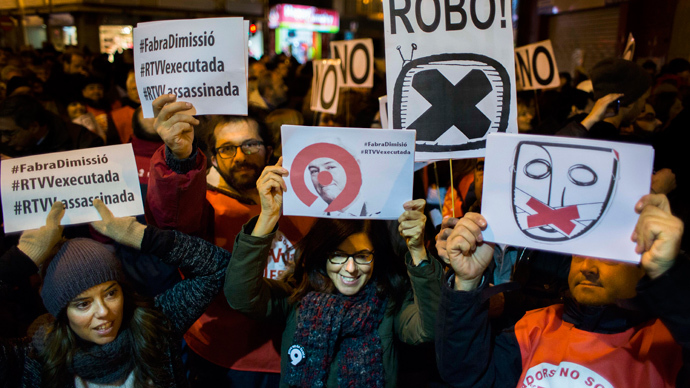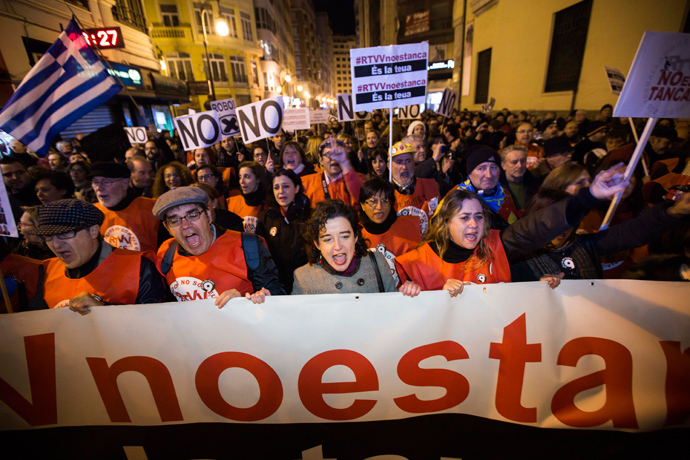‘Repressive law’ could tip the balance of Spanish street protests

Even Spain’s judges believe that the newly adopted draft bill aimed at curbing protests is in fact a repressive law, which will interfere with the existing balance of street rallying throughout the nation, political analyst Miguel-Anxo Murado told RT.
Last week the Spanish government approved draft legislation
introduced by Interior Minister Jorge Fernandez Diaz. The bill
will set fines of up to 30,000 euros for insulting state symbols
and is applicable to offenses such as burning the national flag
or causing serious disturbances at a rally.
The measures also include fines of up to 1,000 euros for
insulting police officers during demonstrations. Those
photographing or recording police actions could also be fined for
doing so.
Murado argues that the law is too vague, and could thus be
misinterpreted.
RT:Isn't this ultimately the protesters' fault?
Surely, after years of weekly demonstrations and clashes the
government had to act?
Miguel-Anxo Murado: The truth is that there have been a
number of demonstrations in Spain in the past few months, in the
past few years. But in reality – very little violence. Think of
the last year, for example, there were around 4000 demonstrations
and only 10 were reported to have seen some violence, and even
not major violence.
So that is what is causing the controversy among things
about this law, the fact that Spain does not really have
the problem of violence in the streets and this is different from
other countries. And even other aspects of the law which deals
with security in general. Spain has one of the lowest crime rates
in Europe. Obviously many people think that the government really
wants to stifle descent.

RT:Spanish police have a reputation for
heavy-handedness. If they can't even be filmed anymore... what's
to keep them in check?
MM: That is a problem because the timing of this law actually
coincides with the series of scandals involving police officers
who had acted brutally, even causing the death of a man recently.
That was filmed by someone, by a passerby, by his mobile phone
and that filming has become the main proof for the trial of these
policemen. So again people clearly feel the temptation to see the
connection between these two things.
RT:According to the draft laws, you'd be forbidden from
insulting the state. Just what does that mean?
MM: Well not just the state but the fact that Spain is sort
of a federal state, although not under that name, also insulting
the symbols of the government of those regions of Spain, even the
local council. Of course, it is a very ugly thing to insult the
state or anything else but the problem is that the law is so
un-precise, so unspecific that it is really not clear what they
mean actually by insulting. Since this is left to police to
decide, this is another controversy surrounding this law. Not a
judge, but policemen would decide. Well many are worried that
this is leaving people unprotected.
RT:And will this effectively kill off protests?
MM: Well I’m not sure. In fact several political groups
are already talking of protesting against these laws. So it could
go exactly the other way around. It could cause more
demonstrations. But what it could certainly cause is a lot of
trouble within the judiciary. The judges, through their own
associations, professional associations today were saying they
don’t know how to deal with the situation. That they think that
this is uncalled for, and that it sidelines the judges from the
process of dealing with balance in the streets, and they think
this is a step backwards, and a repressive law.
The statements, views and opinions expressed in this column are solely those of the author and do not necessarily represent those of RT.












